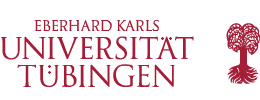Functions of Fiction: What Novels Can Do
(14 Einträge)
Vorlesung Functions of Fiction: What Novels Can Do, 1. und 2. Stunde
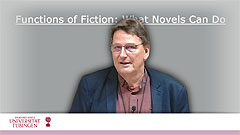

| Title: | Vorlesung Functions of Fiction: What Novels Can Do, 1. und 2. Stunde |
| Description: | Vorlesung im WiSe 2024-2025; Donnerstag, 24. Oktober 2024 |
| Creator: | Christoph Reinfandt (author) |
| Contributor: | ZDV Universität Tübingen (producer) |
| Publisher: | ZDV Universität Tübingen |
| Date Created: | 2024-10-24 |
| Subjects: | Functions of Fiction, Novels, Obeserving the Observer, History, Lecture, |
| Identifier: | UT_20241024_001_ws2425funcofi... |
| Rights: | Rechtshinweise |
| Abstracts: | Whats the use of stories that arent even true? Can there be true lies? What is the truth of fiction? Answers to these questions will be discussed in this lecture course: From its inception at the turn from the seventeenth to the eighteenth century, the modern novel has fulfilled various functions ranging from entertainment to edification and education, from constructing bourgeois subjectivity to deconstructing it, from confirming the social order to satirizing it or posing imagined extensions and alternatives, all the while drawing on an ever-expanding range of narrative and literary techniques not delimited by strict genre rules. The lecture course will try to map the emergence and evolution of the modern novel in English systematically by conceiving of it as a medium of world observation and making sense under specifically modern cultural conditions. The historical survey of the history of the novel emerging from this approach will be supplemented by a series of case studies of particularly interesting examples. |
Vorlesung Functions of Fiction: What Novels Can Do, 3. und 4. Stunde
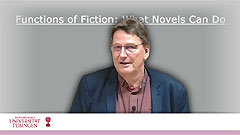

| Title: | Vorlesung Functions of Fiction: What Novels Can Do, 3. und 4. Stunde |
| Description: | Vorlesung im WiSe 2024-2025; Donnerstag, 31. Oktober 2024 |
| Creator: | Christoph Reinfandt (author) |
| Contributor: | ZDV Universität Tübingen (producer) |
| Publisher: | ZDV Universität Tübingen |
| Date Created: | 2024-10-31 |
| Subjects: | Functions of Fiction, Novels, Rise of the Novel, Modern Literature, Functions, Prose, Novel Signifying Practice, Aphra Behn, Daniel Defoe, Samuel Richardson, First-Person Narration, Henry Fielding, Third-Person Narration, Lecture, |
| Identifier: | UT_20241031_001_ws2425funcofi... |
| Rights: | Rechtshinweise |
| Abstracts: | Whats the use of stories that arent even true? Can there be true lies? What is the truth of fiction? Answers to these questions will be discussed in this lecture course: From its inception at the turn from the seventeenth to the eighteenth century, the modern novel has fulfilled various functions ranging from entertainment to edification and education, from constructing bourgeois subjectivity to deconstructing it, from confirming the social order to satirizing it or posing imagined extensions and alternatives, all the while drawing on an ever-expanding range of narrative and literary techniques not delimited by strict genre rules. The lecture course will try to map the emergence and evolution of the modern novel in English systematically by conceiving of it as a medium of world observation and making sense under specifically modern cultural conditions. The historical survey of the history of the novel emerging from this approach will be supplemented by a series of case studies of particularly interesting examples. |
Vorlesung Functions of Fiction: What Novels Can Do, 5. und 6. Stunde
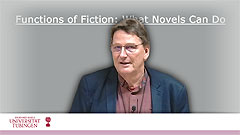

| Title: | Vorlesung Functions of Fiction: What Novels Can Do, 5. und 6. Stunde |
| Description: | Vorlesung im WiSe 2024-2025; Donnerstag, 07. November 2024 |
| Creator: | Christoph Reinfandt (author) |
| Contributor: | ZDV Universität Tübingen (producer) |
| Publisher: | ZDV Universität Tübingen |
| Date Created: | 2024-11-07 |
| Subjects: | Functions of Fiction, Novels, Famous Definitions, Crisis, Romantic Genre, Lecture, |
| Identifier: | UT_20241107_001_ws2425funcofi... |
| Rights: | Rechtshinweise |
| Abstracts: | Whats the use of stories that arent even true? Can there be true lies? What is the truth of fiction? Answers to these questions will be discussed in this lecture course: From its inception at the turn from the seventeenth to the eighteenth century, the modern novel has fulfilled various functions ranging from entertainment to edification and education, from constructing bourgeois subjectivity to deconstructing it, from confirming the social order to satirizing it or posing imagined extensions and alternatives, all the while drawing on an ever-expanding range of narrative and literary techniques not delimited by strict genre rules. The lecture course will try to map the emergence and evolution of the modern novel in English systematically by conceiving of it as a medium of world observation and making sense under specifically modern cultural conditions. The historical survey of the history of the novel emerging from this approach will be supplemented by a series of case studies of particularly interesting examples. |
Vorlesung Functions of Fiction: What Novels Can Do, 7. und 8. Stunde


| Title: | Vorlesung Functions of Fiction: What Novels Can Do, 7. und 8. Stunde |
| Description: | Vorlesung im WiSe 2024-2025; Donnerstag, 14. November 2024 |
| Creator: | Christoph Reinfandt (author) |
| Contributor: | ZDV Universität Tübingen (producer) |
| Publisher: | ZDV Universität Tübingen |
| Date Created: | 2024-11-14 |
| Subjects: | Functions of Fiction, Novels, Realism, Conventions, English Realism, Varieties, Evolution, Lecture, |
| Identifier: | UT_20241114_001_ws2425funcofi... |
| Rights: | Rechtshinweise |
| Abstracts: | Whats the use of stories that arent even true? Can there be true lies? What is the truth of fiction? Answers to these questions will be discussed in this lecture course: From its inception at the turn from the seventeenth to the eighteenth century, the modern novel has fulfilled various functions ranging from entertainment to edification and education, from constructing bourgeois subjectivity to deconstructing it, from confirming the social order to satirizing it or posing imagined extensions and alternatives, all the while drawing on an ever-expanding range of narrative and literary techniques not delimited by strict genre rules. The lecture course will try to map the emergence and evolution of the modern novel in English systematically by conceiving of it as a medium of world observation and making sense under specifically modern cultural conditions. The historical survey of the history of the novel emerging from this approach will be supplemented by a series of case studies of particularly interesting examples. |
Vorlesung Functions of Fiction: What Novels Can Do, 9. und 10. Stunde
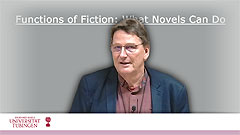

| Title: | Vorlesung Functions of Fiction: What Novels Can Do, 9. und 10. Stunde |
| Description: | Vorlesung im WiSe 2024-2025; Donnerstag, 21. November 2024 |
| Creator: | Christoph Reinfandt (author) |
| Contributor: | ZDV Universität Tübingen (producer) |
| Publisher: | ZDV Universität Tübingen |
| Date Created: | 2024-11-21 |
| Subjects: | Functions of Fiction, Novels, Modernism, Crisis, Modern, Modernity, Modernist, Modern Literature, Turn of the Novel, Evolution, Lecture, |
| Identifier: | UT_20241121_001_ws2425funcofi... |
| Rights: | Rechtshinweise |
| Abstracts: | Whats the use of stories that arent even true? Can there be true lies? What is the truth of fiction? Answers to these questions will be discussed in this lecture course: From its inception at the turn from the seventeenth to the eighteenth century, the modern novel has fulfilled various functions ranging from entertainment to edification and education, from constructing bourgeois subjectivity to deconstructing it, from confirming the social order to satirizing it or posing imagined extensions and alternatives, all the while drawing on an ever-expanding range of narrative and literary techniques not delimited by strict genre rules. The lecture course will try to map the emergence and evolution of the modern novel in English systematically by conceiving of it as a medium of world observation and making sense under specifically modern cultural conditions. The historical survey of the history of the novel emerging from this approach will be supplemented by a series of case studies of particularly interesting examples. |
Vorlesung Functions of Fiction: What Novels Can Do, 11. und 12. Stunde
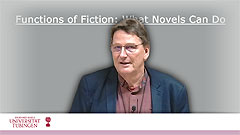

| Title: | Vorlesung Functions of Fiction: What Novels Can Do, 11. und 12. Stunde |
| Description: | Vorlesung im WiSe 2024-2025; Donnerstag, 28. November 2024 |
| Creator: | Christoph Reinfandt (author) |
| Contributor: | ZDV Universität Tübingen (producer) |
| Publisher: | ZDV Universität Tübingen |
| Date Created: | 2024-11-28 |
| Subjects: | Functions of Fiction, Novels, Postmodernism, Pluralism, Eclecticism, Reflexivity, Realism, Modernism, Salman Rushdie, Lecture, |
| Identifier: | UT_20241128_001_ws2425funcofi... |
| Rights: | Rechtshinweise |
| Abstracts: | Whats the use of stories that arent even true? Can there be true lies? What is the truth of fiction? Answers to these questions will be discussed in this lecture course: From its inception at the turn from the seventeenth to the eighteenth century, the modern novel has fulfilled various functions ranging from entertainment to edification and education, from constructing bourgeois subjectivity to deconstructing it, from confirming the social order to satirizing it or posing imagined extensions and alternatives, all the while drawing on an ever-expanding range of narrative and literary techniques not delimited by strict genre rules. The lecture course will try to map the emergence and evolution of the modern novel in English systematically by conceiving of it as a medium of world observation and making sense under specifically modern cultural conditions. The historical survey of the history of the novel emerging from this approach will be supplemented by a series of case studies of particularly interesting examples. |
Vorlesung Functions of Fiction: What Novels Can Do, 13. und 14. Stunde
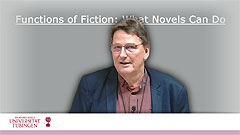

| Title: | Vorlesung Functions of Fiction: What Novels Can Do, 13. und 14. Stunde |
| Description: | Vorlesung im WiSe 2024-2025; Donnerstag, 05. Dezember 2024 |
| Creator: | Christoph Reinfandt (author) |
| Contributor: | ZDV Universität Tübingen (producer) |
| Publisher: | ZDV Universität Tübingen |
| Date Created: | 2024-12-05 |
| Subjects: | Functions of Fiction, Novels, Faith, Modern World, Metaphysics, Metafiction, William Golding, Darkness Visible, Margins of Modernisation, Religious Fundamentalism, Kiran Nagarkar, Gods Little Soldier, Lecture, |
| Identifier: | UT_20241205_001_ws2425funcofi... |
| Rights: | Rechtshinweise |
| Abstracts: | Whats the use of stories that arent even true? Can there be true lies? What is the truth of fiction? Answers to these questions will be discussed in this lecture course: From its inception at the turn from the seventeenth to the eighteenth century, the modern novel has fulfilled various functions ranging from entertainment to edification and education, from constructing bourgeois subjectivity to deconstructing it, from confirming the social order to satirizing it or posing imagined extensions and alternatives, all the while drawing on an ever-expanding range of narrative and literary techniques not delimited by strict genre rules. The lecture course will try to map the emergence and evolution of the modern novel in English systematically by conceiving of it as a medium of world observation and making sense under specifically modern cultural conditions. The historical survey of the history of the novel emerging from this approach will be supplemented by a series of case studies of particularly interesting examples. |
Vorlesung Functions of Fiction: What Novels Can Do, 15. und 16. Stunde


| Title: | Vorlesung Functions of Fiction: What Novels Can Do, 15. und 16. Stunde |
| Description: | Vorlesung im WiSe 2024-2025; Donnerstag, 12. Dezember 2024 |
| Creator: | Christoph Reinfandt (author) |
| Contributor: | ZDV Universität Tübingen (producer) |
| Publisher: | ZDV Universität Tübingen |
| Date Created: | 2024-12-12 |
| Subjects: | Functions of Fiction, Novels, Fictionalising History, Multiple Perspectives, Multiple Narrators, History of the World, Penelope Lively, Moon Tiger, Making History Global, Making History Inclusive, Tabish Khair, The Thing About Thugs, Multiple Media, Adam Thorpe, Ulverton, Lecture, |
| Identifier: | UT_20241212_001_ws2425funcofi... |
| Rights: | Rechtshinweise |
| Abstracts: | Whats the use of stories that arent even true? Can there be true lies? What is the truth of fiction? Answers to these questions will be discussed in this lecture course: From its inception at the turn from the seventeenth to the eighteenth century, the modern novel has fulfilled various functions ranging from entertainment to edification and education, from constructing bourgeois subjectivity to deconstructing it, from confirming the social order to satirizing it or posing imagined extensions and alternatives, all the while drawing on an ever-expanding range of narrative and literary techniques not delimited by strict genre rules. The lecture course will try to map the emergence and evolution of the modern novel in English systematically by conceiving of it as a medium of world observation and making sense under specifically modern cultural conditions. The historical survey of the history of the novel emerging from this approach will be supplemented by a series of case studies of particularly interesting examples. |
Vorlesung Functions of Fiction: What Novels Can Do, 17. und 18. Stunde
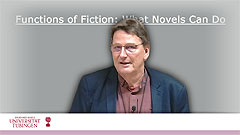

| Title: | Vorlesung Functions of Fiction: What Novels Can Do, 17. und 18. Stunde |
| Description: | Vorlesung im WiSe 2024-2025; Donnerstag, 19. Dezember 2024 |
| Creator: | Christoph Reinfandt (author) |
| Contributor: | ZDV Universität Tübingen (producer) |
| Publisher: | ZDV Universität Tübingen |
| Date Created: | 2024-12-19 |
| Subjects: | Functions of Fiction, Novels, Fictionalising Autobiography, Persistence of Male Discontent, Karl Ove Knausgaard, My Struggle, Female Troubles, Anna Burns, Milkman, Lecture, |
| Identifier: | UT_20241219_001_ws2425funcofi... |
| Rights: | Rechtshinweise |
| Abstracts: | Whats the use of stories that arent even true? Can there be true lies? What is the truth of fiction? Answers to these questions will be discussed in this lecture course: From its inception at the turn from the seventeenth to the eighteenth century, the modern novel has fulfilled various functions ranging from entertainment to edification and education, from constructing bourgeois subjectivity to deconstructing it, from confirming the social order to satirizing it or posing imagined extensions and alternatives, all the while drawing on an ever-expanding range of narrative and literary techniques not delimited by strict genre rules. The lecture course will try to map the emergence and evolution of the modern novel in English systematically by conceiving of it as a medium of world observation and making sense under specifically modern cultural conditions. The historical survey of the history of the novel emerging from this approach will be supplemented by a series of case studies of particularly interesting examples. |
Vorlesung Functions of Fiction: What Novels Can Do, 19. und 20. Stunde
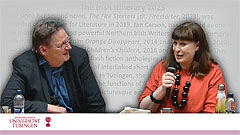

| Title: | Vorlesung Functions of Fiction: What Novels Can Do, 19. und 20. Stunde |
| Description: | Vorlesung im WiSe 2024-2025; Donnerstag, 09. Januar 2025 |
| Creator: | Christoph Reinfandt (author), Jan Carson (author) |
| Contributor: | ZDV Universität Tübingen (producer) |
| Publisher: | ZDV Universität Tübingen |
| Date Created: | 2025-01-09 |
| Subjects: | Functions of Fiction, Novels, Jan Carson, Reading, The Last Resort, Guest Lecture, |
| Identifier: | UT_20250109_001_ws2425funcofi... |
| Rights: | Rechtshinweise |
| Abstracts: | Whats the use of stories that arent even true? Can there be true lies? What is the truth of fiction? Answers to these questions will be discussed in this lecture course: From its inception at the turn from the seventeenth to the eighteenth century, the modern novel has fulfilled various functions ranging from entertainment to edification and education, from constructing bourgeois subjectivity to deconstructing it, from confirming the social order to satirizing it or posing imagined extensions and alternatives, all the while drawing on an ever-expanding range of narrative and literary techniques not delimited by strict genre rules. The lecture course will try to map the emergence and evolution of the modern novel in English systematically by conceiving of it as a medium of world observation and making sense under specifically modern cultural conditions. The historical survey of the history of the novel emerging from this approach will be supplemented by a series of case studies of particularly interesting examples. |
Vorlesung Functions of Fiction: What Novels Can Do, 21. und 22. Stunde
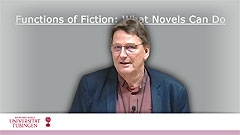

| Title: | Vorlesung Functions of Fiction: What Novels Can Do, 21. und 22. Stunde |
| Description: | Vorlesung im WiSe 2024-2025; Donnerstag, 16. Januar 2025 |
| Creator: | Christoph Reinfandt (author) |
| Contributor: | ZDV Universität Tübingen (producer) |
| Publisher: | ZDV Universität Tübingen |
| Date Created: | 2025-01-16 |
| Subjects: | Functions of Fiction, Novels, New Paths of the Novel, Text in the Hand, A.L. Kennedy, The Blue Book, Tom McCarthy, Satin Island, Booker Prize Winner, Bernardine Evaristo, Girl, Woman, Other, Matters of Fact, Matters of Concern, Lecture, |
| Identifier: | UT_20250116_001_ws2425funcofi... |
| Rights: | Rechtshinweise |
| Abstracts: | Whats the use of stories that arent even true? Can there be true lies? What is the truth of fiction? Answers to these questions will be discussed in this lecture course: From its inception at the turn from the seventeenth to the eighteenth century, the modern novel has fulfilled various functions ranging from entertainment to edification and education, from constructing bourgeois subjectivity to deconstructing it, from confirming the social order to satirizing it or posing imagined extensions and alternatives, all the while drawing on an ever-expanding range of narrative and literary techniques not delimited by strict genre rules. The lecture course will try to map the emergence and evolution of the modern novel in English systematically by conceiving of it as a medium of world observation and making sense under specifically modern cultural conditions. The historical survey of the history of the novel emerging from this approach will be supplemented by a series of case studies of particularly interesting examples. |
Vorlesung Functions of Fiction: What Novels Can Do, 23. und 24. Stunde
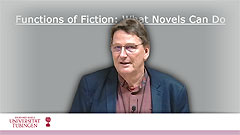

| Title: | Vorlesung Functions of Fiction: What Novels Can Do, 23. und 24. Stunde |
| Description: | Vorlesung im WiSe 2024-2025; Donnerstag, 23. Januar 2025 |
| Creator: | Christoph Reinfandt (author) |
| Contributor: | ZDV Universität Tübingen (producer) |
| Publisher: | ZDV Universität Tübingen |
| Date Created: | 2025-01-23 |
| Subjects: | Functions of Fiction, Novels, Suprapersonal Narration, Imagining the Environment, Climate Change, Richard Powers, The Overstory, AI Fiction, Nicola Barker, H(A)PPY, Lecture, |
| Identifier: | UT_20250123_001_ws2425funcofi... |
| Rights: | Rechtshinweise |
| Abstracts: | Whats the use of stories that arent even true? Can there be true lies? What is the truth of fiction? Answers to these questions will be discussed in this lecture course: From its inception at the turn from the seventeenth to the eighteenth century, the modern novel has fulfilled various functions ranging from entertainment to edification and education, from constructing bourgeois subjectivity to deconstructing it, from confirming the social order to satirizing it or posing imagined extensions and alternatives, all the while drawing on an ever-expanding range of narrative and literary techniques not delimited by strict genre rules. The lecture course will try to map the emergence and evolution of the modern novel in English systematically by conceiving of it as a medium of world observation and making sense under specifically modern cultural conditions. The historical survey of the history of the novel emerging from this approach will be supplemented by a series of case studies of particularly interesting examples. |
Vorlesung Functions of Fiction: What Novels Can Do, 25. und 26. Stunde
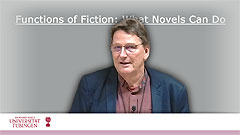

| Title: | Vorlesung Functions of Fiction: What Novels Can Do, 25. und 26. Stunde |
| Description: | Vorlesung im WiSe 2024-2025; Donnerstag, 30. Januar 2025 |
| Creator: | Christoph Reinfandt (author) |
| Contributor: | ZDV Universität Tübingen (producer) |
| Publisher: | ZDV Universität Tübingen |
| Date Created: | 2025-01-30 |
| Subjects: | Functions of Fiction, Novels, Dissolution of Genre Fiction, Weird Fiction, Science Fiction, Fantasy Fiction, China Miéville, Embassytown, History as Fantasy, R.F. Kuang, Babel, Realism, Absurdity, Lecture, |
| Identifier: | UT_20250130_001_ws2425funcofi... |
| Rights: | Rechtshinweise |
| Abstracts: | Whats the use of stories that arent even true? Can there be true lies? What is the truth of fiction? Answers to these questions will be discussed in this lecture course: From its inception at the turn from the seventeenth to the eighteenth century, the modern novel has fulfilled various functions ranging from entertainment to edification and education, from constructing bourgeois subjectivity to deconstructing it, from confirming the social order to satirizing it or posing imagined extensions and alternatives, all the while drawing on an ever-expanding range of narrative and literary techniques not delimited by strict genre rules. The lecture course will try to map the emergence and evolution of the modern novel in English systematically by conceiving of it as a medium of world observation and making sense under specifically modern cultural conditions. The historical survey of the history of the novel emerging from this approach will be supplemented by a series of case studies of particularly interesting examples. |
Vorlesung Functions of Fiction: What Novels Can Do, 27. und 28. Stunde
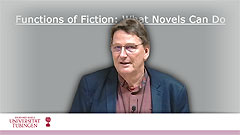

| Title: | Vorlesung Functions of Fiction: What Novels Can Do, 27. und 28. Stunde |
| Description: | Vorlesung im WiSe 2024-2025; Donnerstag, 06. Februar 2025 |
| Creator: | Christoph Reinfandt (author) |
| Contributor: | ZDV Universität Tübingen (producer) |
| Publisher: | ZDV Universität Tübingen |
| Date Created: | 2025-02-06 |
| Subjects: | Functions of Fiction, Novels, Use of Stories that Aren't Even True, Representation, Signification, Functional History, Field(s) of Fiction, Turtles all the Way Down, Lecture, |
| Identifier: | UT_20250206_001_ws2425funcofi... |
| Rights: | Rechtshinweise |
| Abstracts: | Whats the use of stories that arent even true? Can there be true lies? What is the truth of fiction? Answers to these questions will be discussed in this lecture course: From its inception at the turn from the seventeenth to the eighteenth century, the modern novel has fulfilled various functions ranging from entertainment to edification and education, from constructing bourgeois subjectivity to deconstructing it, from confirming the social order to satirizing it or posing imagined extensions and alternatives, all the while drawing on an ever-expanding range of narrative and literary techniques not delimited by strict genre rules. The lecture course will try to map the emergence and evolution of the modern novel in English systematically by conceiving of it as a medium of world observation and making sense under specifically modern cultural conditions. The historical survey of the history of the novel emerging from this approach will be supplemented by a series of case studies of particularly interesting examples. |
